This discussion and review contains spoilers for Star Trek: Strange New Worlds episode 7, “The Serene Squall.”
There is an interesting allegory at the heart of “The Serene Squall,” but it ends up muddled by a clumsy and thoughtless execution.
The actual plot of “The Serene Squall” is standard Strange New Worlds stuff, a grab bag of familiar Star Trek tropes assembled in a fairly unimaginative manner to fill around 50 minutes of television. Ironically for a series that many claim is returning the franchise to its roots, it is a “space pirate” episode built around one of the most tired of space opera clichés — and one that Gene Roddenberry expressly forbade on The Next Generation, according to Jeri Taylor.
Of course, that never actually stopped the franchise. Space pirate adventures became a staple of the later series following Roddenberry’s death, with examples like “Gambit” on The Next Generation or the mirror universe episodes on Deep Space Nine. “The Serene Squall” blends that template with a familiar hijacking narrative, recalling episodes like “Starship Mine,” “Basics,” “The Killing Game,” “One Little Ship,” and “Shockwave, Part II.”
Even smaller moments feel ripped from other episodes. Early in the adventure, the ship is trapped within “a net, except made with lasers” that “appears to be growing smaller,” evoking the central premise of “The Tholian Web.” The climax of the episode, in which Spock (Ethan Peck) has to stage a theatrical declaration of love, recalls a similar sequence at the climax of “Ménage à Troi” in which Picard (Patrick Stewart) has to espouse his love for Lwaxana Troi (Majel Barrett Roddenberry).
It’s all standard stuff. At best, it allows Anson Mount to be charming in an underwritten subplot. At worst, it encourages Irish guest actor Michael Hough to present the franchise’s most cringeworthy take on Irishness this side of “Spirit Folk,” if not “Up the Long Ladder.” There is very little of particular note here. Like the previous six episodes, it consists of familiar elements arranged in familiar patterns, better than some earlier examples from the franchise’s history and worse than others.
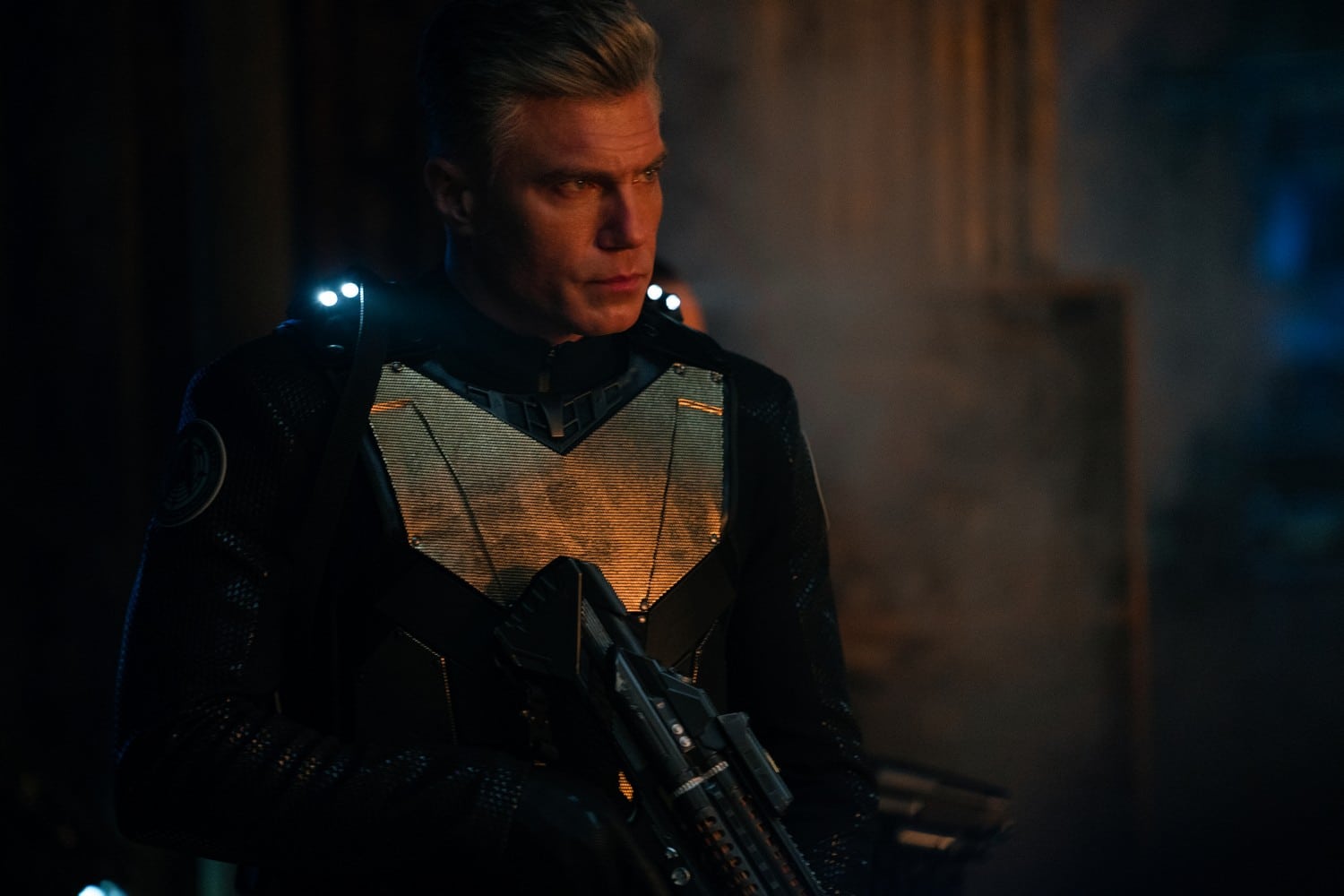
The most interesting stuff in “The Serene Squall” is all happening in subtext, in the way in which the episode is built around the character of Spock. Building off the character’s long history as “a child of two words,” “The Serene Squall” returns to the classic tension within the science officer’s character. As somebody who is half-human and half-Vulcan, which path does he walk? This arc was a source of fantastic character drama for both Leonard Nimoy and Zachary Quinto.
It is to the credit of Strange New Worlds in general and “The Serene Squall” in particular that the episode finds a fresh new angle on this question, by suggesting that the answer might be “neither.” As Captain Angel (Jesse James Keitel) advises Spock before abandoning the Enterprise, “That is and always has been a false choice. The question isn’t what you are; it’s who you are.” Spock doesn’t need to define himself by the false binary of being either human or Vulcan. He is Spock.
It’s a genuinely thoughtful angle on a familiar character arc. More than that, it works as an effective metaphor for evolving understandings of gender, specifically the idea that one’s gender need not be biologically determined or strictly binary. “The Serene Squall” reinforces this subtext by casting Keitel in the role of Angel, the character confronting Spock with these ideas. Keitel was famously the first openly trans and non-binary series regular on primetime American network television.
This is a logical evolution for Spock as a character. Spock has been a queer icon since the original Star Trek. Kirk and Spock were the original “slash” pairing. Gene Roddenberry would famously write in his novelization that Spock thought of Kirk as his “t’hy’la,” a term that can mean “friend,” “brother,” and “lover.” Spock’s status as an outsider, the challenges that he faced in presenting himself to the outside world, and his difficult relationship with his own identity all resonated with queer fans.
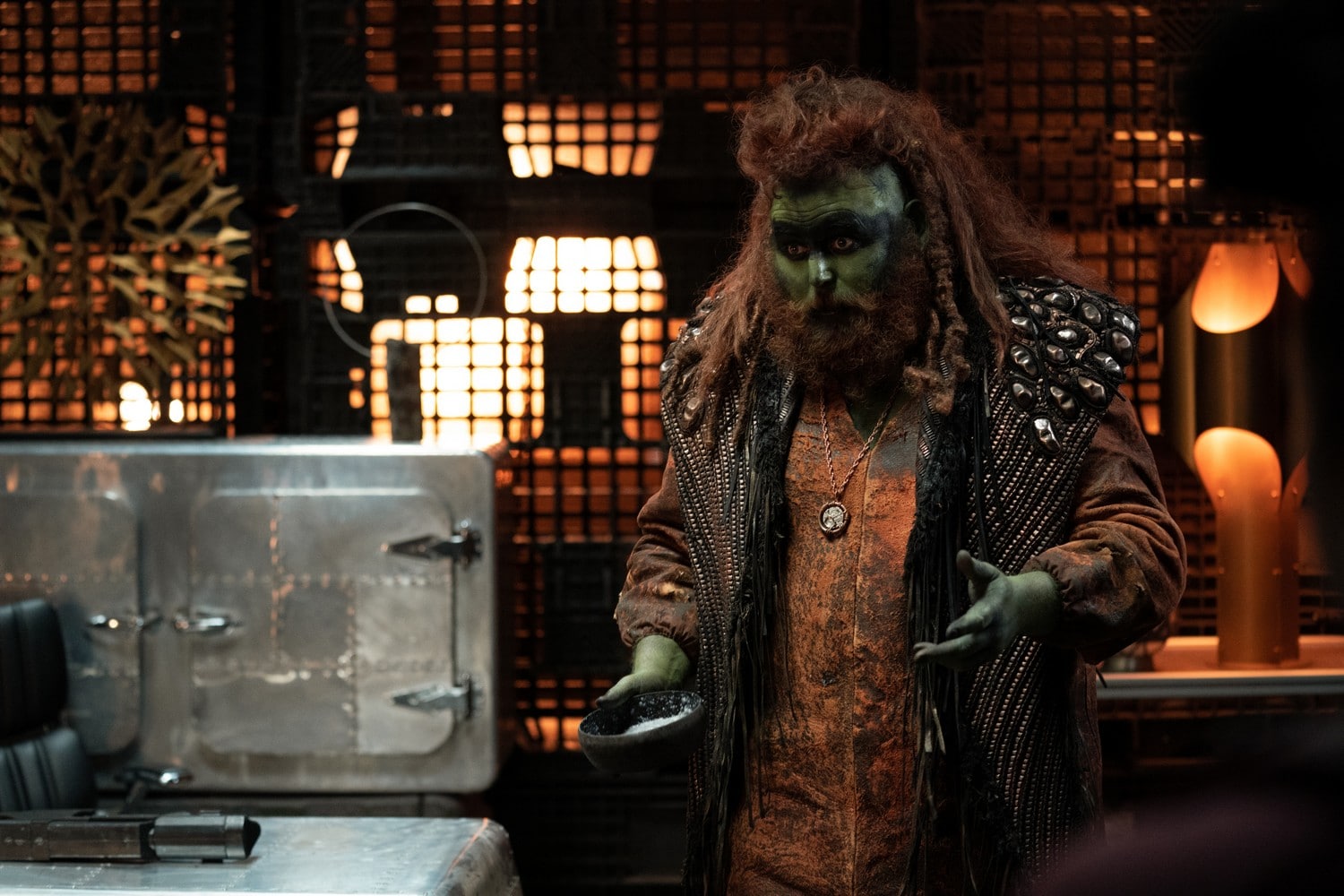
“The Serene Squall” layers this subtext into its teleplay. When Pike (Mount) instructs Ortegas (Melissa Navia) to get the ship closer to a distress signal, she couches scales of distance in overtly sexual terms, asking, “First date or third date?” He replies, “Blind date.” The episode finds the Enterprise venturing into “non-Federation space,” which Pike describes as “this quadrant’s wild, wild west” and that appears to be outside of Klingon influence as well, rejecting its own rigid binaries.
For decades, this was how Star Trek dealt with issues around sexuality. Producer David Livingston ran down to the set of “The Offspring” to prevent a shot of two same-sex extras holding hands. In his exit interview following his departure from the franchise in 1999, writer Ronald D. Moore made it clear that the “people in charge don’t want gay characters” in the franchise. Deep Space Nine had to deal with homosexuality through allegory in episodes like “Rejoined” or “Chimera.”
Whatever problems one might have with Star Trek: Discovery, the show has at least been more courageous than its predecessors in portraying characters with these sorts of sexual identities. Stamets (Anthony Rapp) and Culber (Wilson Cruz) were the franchise’s first openly gay couple, allowing for the implication of such a coupling in Star Trek Beyond. Adira (Blu del Barrio) and Gray Tal (Ian Alexander) were a couple composed of a non-binary human and a transgender Trill.
With this in mind, it feels disappointing that Strange New Worlds is effectively pushing Spock back into what film historians have described as “the celluloid closet,” dealing with queerness through allegory and metaphor rather than simply accepting it as a reality of life. Surely, it would be more interesting and more organic to have a member of the cast actually explore their sexual identity, rather than couching it in metaphor. Indeed, it would be interesting to see Spock himself explore it.
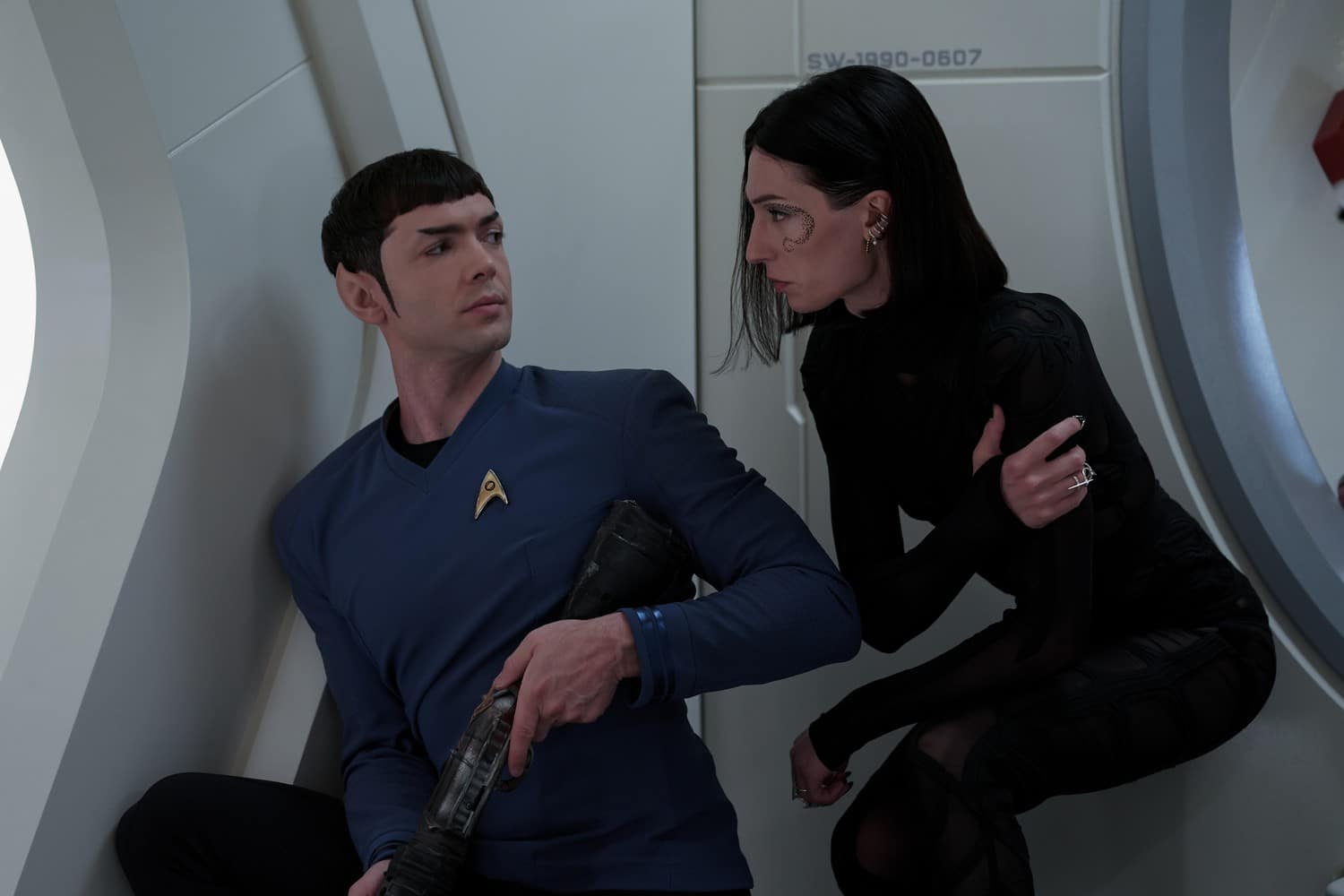
This is illustrative of how Strange New Worlds feels regressive in its nostalgic yearning to recapture the spirit of older Star Trek. There are any number of valid criticisms of modern Star Trek, but the franchise’s recent history has done a much better job tackling issues around sex and sexuality than the era that Strange New Worlds so heavily evokes. Even “Chimera” understood that the franchise’s inability to confront these themes directly represented a failure of the franchise’s utopian idealism.
Strange New Worlds reduces this theme of sexual identity to metaphor and, in doing so, muddles a fairly straightforward theme. After all, Spock receives these lectures on being true to himself from a character who spends most of the episode pretending to be someone they are not. “I must point out the irony of you questioning my identity,” Spock states, and he is not wrong. Keitel is great in the role of Angel, particularly vamping it up after the turn, but it undermines the story’s core theme.
While the episode certainly doesn’t intend this reading, it is unfortunate that “The Serene Squall” arrives in a culture where trans people are often (incorrectly) framed as predators lying about their identity for nefarious purposes. It is similar to the big problem with “Lift Us Where Suffering Cannot Reach,” which has been read by some reviewers as a parable that argues that the death of innocent children is a small price to pay for the Second Amendment. Metaphor must be used carefully.
Befitting a Star Trek show that draws so heavily from Voyager, there is a curious reactionary streak to “The Serene Squall.” Early in the episode, it is revealed that “entering non-Federation space requires Starfleet approval.” This seems unusually isolationist and paranoid for the Federation, given both the title of the show and Pike’s promise in the opening monologue to “go where no one has gone before.” It is hard to explore any new worlds without leaving familiar territory.
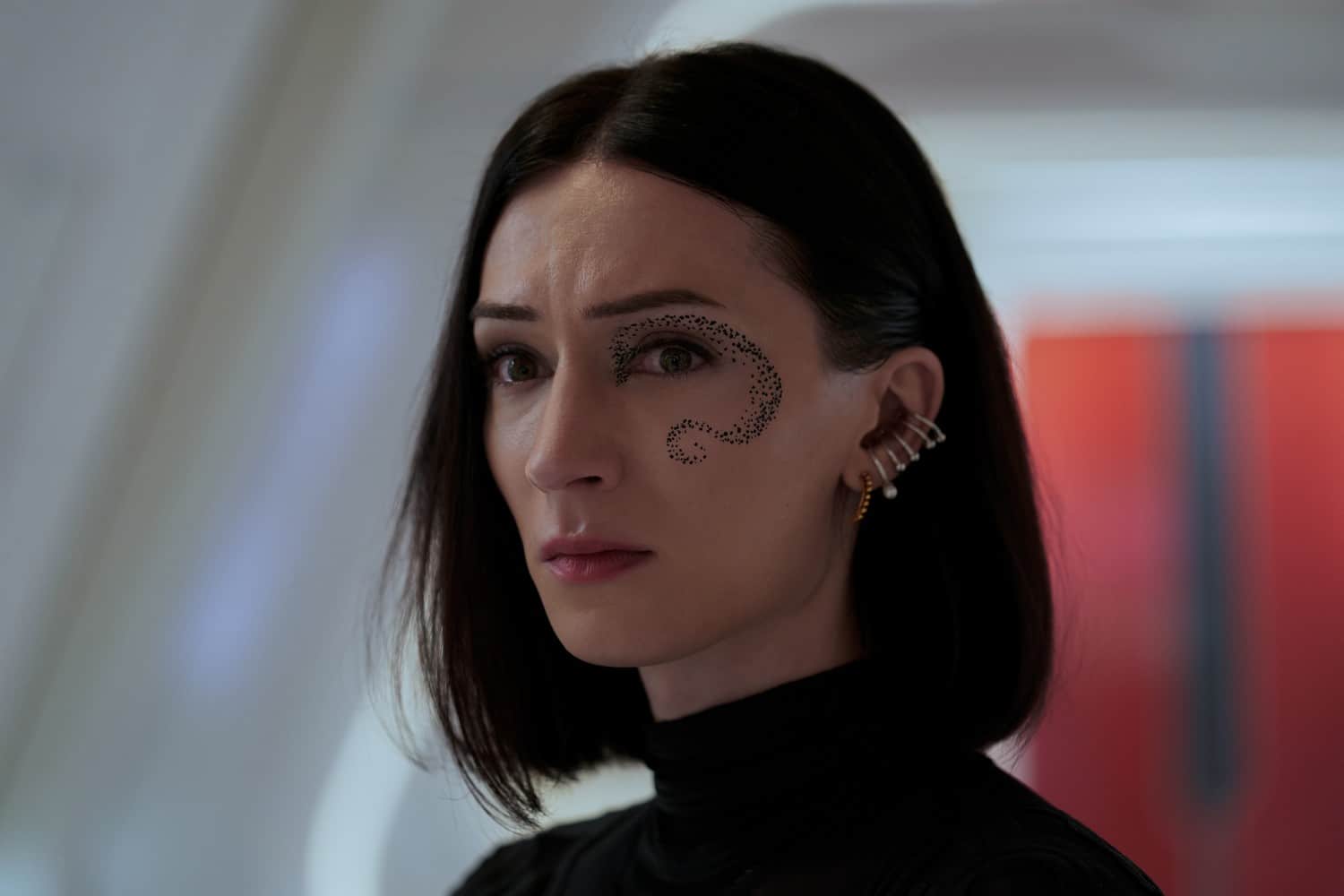
The problem is compounded by the revelation that the entire mission was a ruse concocted by Angel. Pike is lured into the darkness because he believes that people outside Federation space need his help. He is motivated by humanism and concern. Indeed, the decision to imply that the crew is dealing with human rights abuses “on the border” has particularly pointed connotations given the well-documented events occurring on the border between the United States and Mexico.
Outside of the premiere, Strange New Worlds has been reluctant to engage with contemporary politics, but that is an interesting hook. After all, allowing for some issues in its first season, Picard has been quite explicit in its commentary on the contemporary immigration crisis. However, it is all a ruse. “I told a nice little story that I knew would bring you out here, and you believed me,” Angel confesses. “Frankly, that’s on you.” They state, “I’ve been using emotion to sway you all day.”
Again, it is a horrifically muddled metaphor. Recalling Voyager episodes like “Displaced” or “Day of Honor,” suddenly “The Serene Squall” becomes a paranoid conspiracy theory about how the humanitarian crisis on the border is really just a sinister ploy being played on gullible idiots to allow criminal gangs to infiltrate and take over existing structures. It is the most cynical and reactionary take on the premise imaginable. Then again, maybe Strange New Worlds is evoking Voyager.
“The Serene Squall” also leans heavily on established continuity, (re-)introducing both the character of Stonn (Roderick McNeill) and acknowledging Spock’s half-brother Sybok, who is played by an extra so the role could be recast with a more famous actor. All this serves to make the Star Trek universe seem small and incestuous. “The Serene Squall” becomes a story about Angel hijacking Spock’s ship to convince Spock’s fiancée to release Spock’s half-brother. It’s all frustratingly insular.
Then again, that is perhaps Strange New Worlds in a nutshell. It often feels like a Star Trek show too enthusiastically heading backwards to boldly go anywhere new.

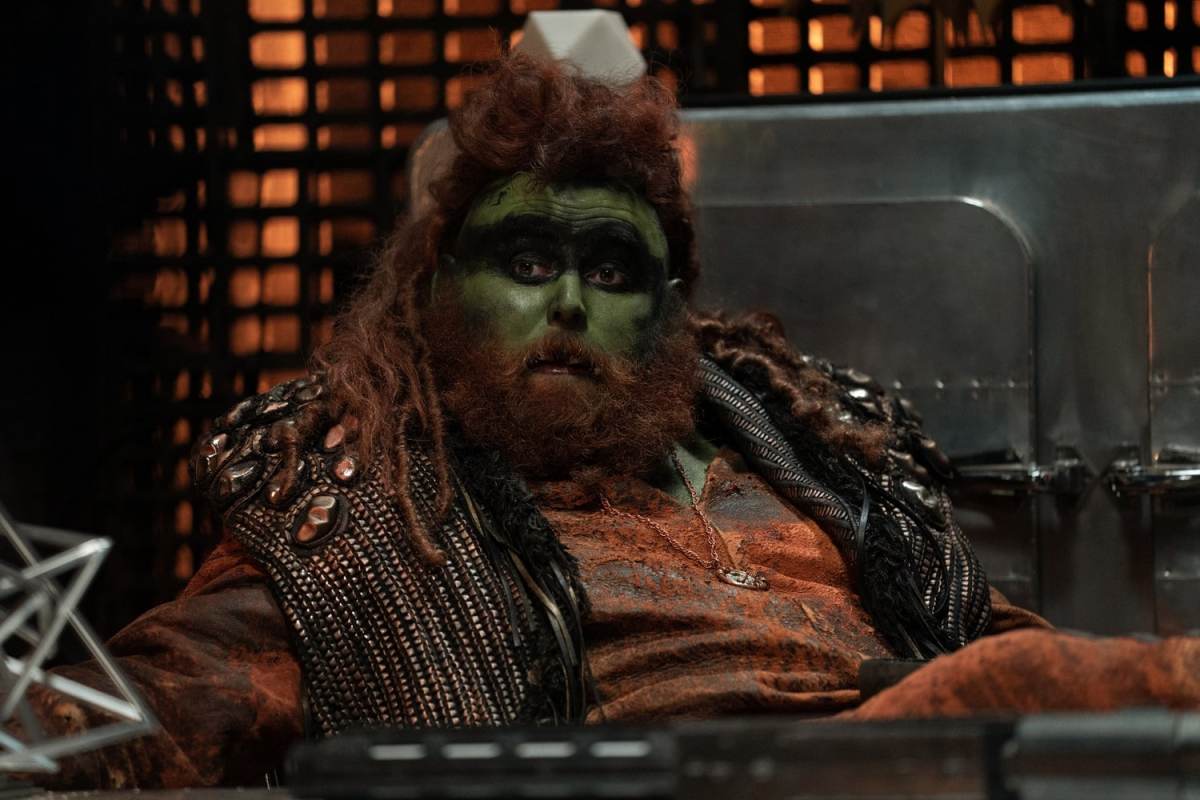




Published: Jun 16, 2022 11:00 am